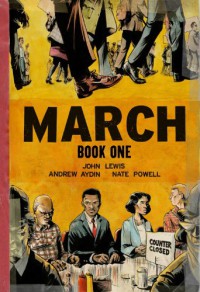

Although Dr. King played in inspirational role in young John Lewis' life, his story was more than being Dr. King's sidekick. I think Lewis' story is one of similar stories from the time and place - young people restless for change while also respecting their elders' feelings and opinions. Book one in the trilogy begins not at the beginning of Lewis' life, but at the beginning of President Obama's first term in office; throughout the story, Lewis is getting ready for the inauguration and retelling his story (and the beginnings of the Civil Rights Movement) to two young visitors' who stopped by his office on their way to the inauguration. I learned so much about Lewis and his role in the Nashville lunch counter protests. And I really liked and appreciated that Lewis mentioned women that he worked with for the cause (for example, Diane Nash), rather than making it a sausage fest. Lewis also names other lesser-known CRM workers such as Jim Lawson and Z. Alexander Looby. This book ends with the beginnings of the Student Nonviolent Coordinating Committee.
The art was black and white and the layout was easy to follow. I did find some of the dialog hard to read due to differing fonts that were unintelligible (for a reason that relates to the story). I only had one problem reading this book - the fact that I did not have books two and three on hand to continue the story. Looks like I will be doing some library requests tonight :D 5 stars.
The most important part (for me) was this quote, spoken by young Lewis:
On April 5th, those empty streets brought an offer from the mayor's committee. It proposed a system of "partial integration"-- which was the same to us as partial segregation. But it was supported by two black committee members -- Fisk President Wright, and T.S.U. President W.S. Davis. This felt like a betrayal, and was more evidence of the differences between our generations. We saw that evidence the next time Thurgood Marshall spoke at Fisk. "Look, once you've been arrested, you've made your point,' he said. Thurgood Marshall was a good man, but listening to him speak convinced me, more than ever, that our revolt was as much against the traditional black leadership structure as it was against segregation and discrimination.

 10
10
